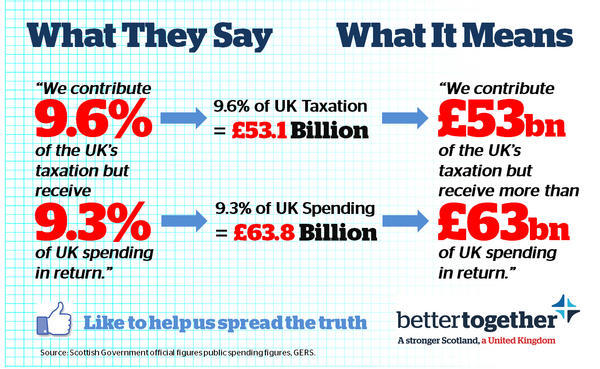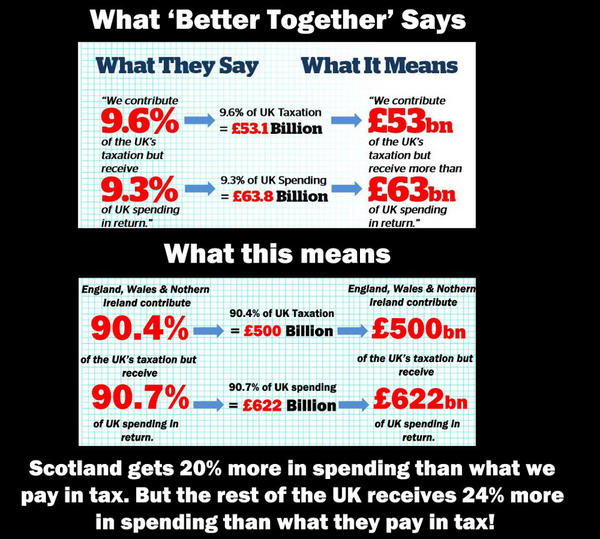I have put “what she said” in normal type with my answers on what she really meant (as far as it had any meaning whatsoever) in bold.
I have absolutely no hope that it will persuade dedicated Nationalists, but the general public must some day wake up to the misinformation and outright lies that the SNP routinely uses to make its “case”.
Anyway, here goes...
What Joan McAlpine said in her Daily Record Article:
“Triumphant Tories guffawed on the Westminster green benches as George Osborne made cheap jibes about the falling oil price and its effect on Scotland.”
And what she really meant ;
The SNP lied about a constant and predictable high-level price of oil (as Ms McAlpine admits later in the article). She was mortified to be reminded of the lie.
“Aberdonians watching the speech asked what was so funny. Economic activity in the city is down and folk are fearful for their future.”
Indeed they are, but economic activity is down because NS Oil is at around $43/barrel instead of the $113 the SNP predicted and needed for their so-called “economic case for independence” to make any sense. Perhaps Joan McAlpine could tell what she, and the SNP, are doing to help the people in Aberdeen, apart from trying to use the fact for cheap politics.
“But Tory MPs saw only saw a chance to attack the SNP and mock Scotland.”
She equates attacking SNP lies and incompetence as “mocking Scotland”. Or pretends she does so she can vent false emotion and deflect attention on to the “insult” to "Scotland". But it is not the same thing and she knows it.
“Then Labour followed suit. At First Minister’s Questions on Thursday, Scottish Labour leader Kezia Dugdale focused entirely on oil, appearing to blame the SNP for its falling price.”
More lies. Kez didn’t blame Sturgeon for falling oil prices. She blamed the SNP for its faulty predictions which every independent economic commentator got right but the SNP got wrong. And also for not admitting that the oil price is volatile** (as Joan McAlpine admits later in this article).
“Sorry Kez, but we’re not in OPEC in case you hadn’t noticed. It was a bizarre line of questioning. Where are Labour’s priorities?”
The usual diversionary "oh look a squirrel" and “don’t ask us too many hard questions” and point the finger at Labour. Typical SNP.
“Scotland has been dealt a six per cent budget cut by Osborne. That cut – and its implications for our public services – should be the top concern for Scottish politicians.”
This is really interesting because the statement as it stands is essentially true: the Tories have cut public spending with knock effects on the Barnett allocation. But Local Government, on whom most of the public services delivery is placed, has been cut even more deeply in Scotland – by the SNP – than in England by the Tories. So the tears for cuts in public services are crocodile tears*.
And that’s before the effects of the Council Tax Freeze (which has cut a potential £2bn from LA budgets) on our ability to deliver these services is considered.
“In the decade up to 2020, we will have lost £3.9billion under the Tories.”
Yes, but there are many and complex reasons for that and it has nothing to do with the SNP’s lies over the oil price. Very much in the “Oh look, a squirrel!” category.
“Why do Kezia and Scottish Labour have so little to say about that vindictive attack on our people? Kezia prefers the familiar ground she tramped with the Tories in the Better Together campaign, blaming the SNP.”
Kez and Labour have plenty to say about the Tories and austerity, but it was FMQs so she asked a question relevant to the occasion and the FM’s responsibilities. If Joan McAlpine doesn’t understand that she’s an even bigger idiot than previously advertised.
“The unionist parties seem thrilled by the oil slump. Some don’t even try to hide their delight.”
Not thrilled, sober. But glad we dodged the SNP’s bullet and also now have real proof that we were right during the referendum campaign and Joan McAlpine and the SNP were wrong. And continue to be wrong.
“They claim it makes independence impossible”
Nobody claims "independence" is impossible.
Economically unwise. Impractical. Stupid even. Daft. If Joan McAlpine is really concerned about performance of Scotland's economy and the financing of public services as she says in this article, she would see that making Scotland poorer isn’t the way to improve either.
“But the Yes campaign always said oil was just a bonus.”
Yes…but ….I didn’t hear much of that until AFTER the oil price collapsed.
And the SNP’s own White Paper (Nov 2013) put oil revenues at the heart of follishly optimistic forecasts of total revenues. If independent we would be £9bn down on their forecasts. What price then the crocodile tears* over Tory austerity and public service cuts?
“Wealth per head in Scotland is similar to the UK without including oil.”
Another squirrel (but as an aside: if we are so well off now what would “independence” have delivered, even if the SNP had been right…which they are not)
“Standard and Poor credit ratings agency, who calculate how safe individual governments are for lenders, confirmed this before the referendum. They said: “Even excluding North Sea output Scotland would qualify for our highest economic assessment.
It’s raining squirrels!!
“Nobody predicted how sharply the oil price would fall.”
Sturgeon was told by the oil industry and by Sir Ian Wood and by every oil expert that the price would fall to around $60/barrel by end 2014 and that the reserves were less than they claimed. Can’t see how falling to $43/barrel helps the SNP case. Just makes it worse.
“The UK’s own Department of Energy and Climate Change had more optimistic projections for oil prospects than the Scottish Government last year.”
This untrue but it is a complex matter with an answer too long for this blog. Kevin Hague explains it best here http://chokkablog.blogspot.co.uk/
“The shock fall has come as a result of the Saudis over-producing – with geopolitics playing its part. But it won’t last. The oil price is volatile and will rise again. The price per barrel was lower in the late 1980s than today. It remained sluggish in the 1990s before shooting skywards.
But the North Sea is vulnerable because of past mismanagement at UK level as Westminster have the entire responsibility for energy.”
The fall was not a shock to anyone who knew what was likely. It was worse than many people thought it would be but everyone who was in the know predicted a large and imminent fall. Except the SNP (I suspect they actually did but couldn’t face the consequences for the so-called “economic case for independence”).
“The oil price is volatile and will rise again**.”
This is the heart of the matter. Whether the oil price falls or rises over the short term is one thing and, in this case, the fall has destroyed the SNP’s case very quickly and very completely.
But the real argument against basing your economic projections on a single dominant commodity is that it WILL ALWAYS be volatile. Predicting when and where is always difficult, but there will certainly be booms and busts. To say blithely that the price would be £113/barrel for the foreseeable future (and we could therefore base our economic future on that forecast) was always the SNP’s biggest mistake (lie if you like).
That the oil price fell this year is a matter of the prevailing conditions. But the truth is: the price would have fallen at some time. And the SNP pretended that would never happen.
BTW, if the price had doubled or tripled instead of falling by 2/3ds that would have been another problem…….
“Labour and Tory governments squandered Scotland’s vast oil wealth from the 1970s onwards – by failing to set up a rainy day fund with the revenue. Such a fund helps cushion national economies in the bad times. Every oil-producing country has one – except the UK and Iraq.”
Another squirrel. If UK Govts got stuff wrong in the past (and that’s debatable and a separate argument) it is no excuse for the SNP getting their predictions so catastrophically wrong now.
“Norway has built up a massive £560billion nest egg. It’s being used to help pay for public services there to ensure the country continues to have no deficit.”
This statement is an argument for staying within the UK. Norway is now eating into this cash because, unlike Scotland, as a small economy with no larger economic shelter, it has been left exposed in the current economic situation as an independent Scotland would have been, sovereign fund or not.
“Compare this with Britain where successive Labour and Tory chancellors have accumulated a national debt of £1.5trillion.”
It’s a full-blown squirrel-storm!!! The UK deficit has many and complicated origins. But it has nothing to do with the SNP getting their understanding of economics – and oil economics in particular – so badly wrong.
“For decades, unionist parties presided over a massive transfer of wealth from Scotland to the south.”
Nonsense on stilts! Any facts to show this?
“For 30 years, whether the price of oil was high or low, Scotland paid more tax per head than the UK – because of oil.”
More nonsense. Bigger stilts.
“The UK would have gone bust without North Sea oil during the financial crisis.”
Completely self-deluding, self-pitying, self-justifying foolishness. Where is the evidence for this bizarre statement. Where is the proof ?
BTW “in Joan McAlpine’s heated imagination” doesn’t count.
“It’s not mockery they should be dishing out to Scots. It’s an apology.”
I’ve no problem mocking the SNP’s economic illiteracy and I would welcome their much delayed apology.






